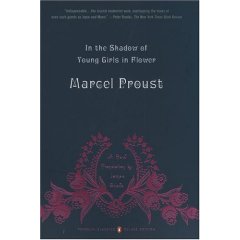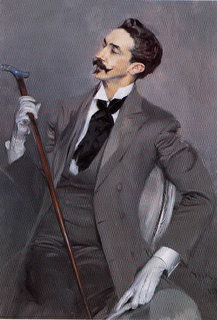
Still reading In the Shadow of Young Girls in Flower.
The narrator is still at Balbec with his grandmother. Saint-Loupe has made his appearance.
And I have finally been introduced to the larger than life Baron de Charlus.
Much have been written about de Charlus - one of Proust's most memorable creations, according to various critics and biographers. I have formed an impression of an aristocratic monomaniac, with an ego as consuming and glorious as the Sun, and everyone else just satellite around him.
De Charlus is said to be loosely based on Robert de Montesquiou, French Symbolist poet and art collector – and all around snob.
Proust seemed to have fawned on Montesquiou, and it seemed like a calculated relationship for the writer. "Proust was impressed by Montesquiou's combination of reverence for the arts and extraordinary social connections; the young man shared the first and coveted the second," wrote Edmund White.
In fact, White has quite a few things to say about Robert de Montesquiou:
In 1893 Proust met Robert de Montesquiou at the house of the hostess-painter Madeleine Lemarie … Montesquiou – a monster of egotism who needed constant praise as exaggerated as that which Nero had required, and who could be as sadistic as the Roman emperor if it was not forthcoming – was thirty-seven when Proust, just twenty-two years old, met him. In 1909 he gave a hint of his pretensions when he answered a questionnaire (“Who are you?”) by saying: “Related to a large part of the European aristocracy. Ancestors: Field-Marshals: Blaise de Montluc, Jean de Gassion, Pierre de Montesquiou, Anne-Piere de Montesquiou, the conqueror of Savoy, d’Artagnan (the hero of The Three Musketeers), the abbot de Montesquiou, Louis XVIII’s minister, the General Count A. de Montesquiou, Napoleon’s aide-de-camp.” Proust admired his dandy with his leanness (“I look like a greyhound in a greatcoat,” he said of himself), his fabled friendships with legendary poets such as Verlaine and Mallarme, and his cult of the beautiful conducted in his extravagant house, the Rose Pavilion…
Montesquiou was a grand seigneur, distinguished by such overweening pride that a society painter was once overheard saying about him, “There’s one good thing about the French Revolution. If it hadn’t happened, that man would have us beating his ponds to keep the frogs quiet.”
In his high-pitched, grating voice Montesquiou was constantly recited his own poetry from volumes with names like Hydrangeas, The Bats, and The Red Beads, or presiding over literary and musical soirees. No praise was too extravagant, and Proust knew how to lay it on thick. "You are the sovereign not only of transitory, but of eternal things," Proust wrote him. On another occasion Proust (ridiculously) compared him to the seventeenth-century playwright Corneille, the father of Frrench classical theater. But Proust was also the master of the nuanced compliments; after Montesquiou showed him his celebrated Japanese dwarf trees, Proust had the nerve to write him that his soul was "a garden as rare and fastiduous as the one in which you allowed me to walk the other day ..." And Montesquiou heard that Proust kept his friends in stitches imitating his way of speaking, of lauging, and of stamping his foot. Most daring of all, Proust proposed to write an essay to be titled "The Simplicity of Monsieur Montesquiou," who had never been previously accused of such a quality.
~ pp 59-60 from Marcel Proust: A Penguin Life

<--- Portrait of a Snob
1 comment:
Interesting stuff! I'm not that far into In the Shadow yet, but I'm on my way ...
Post a Comment